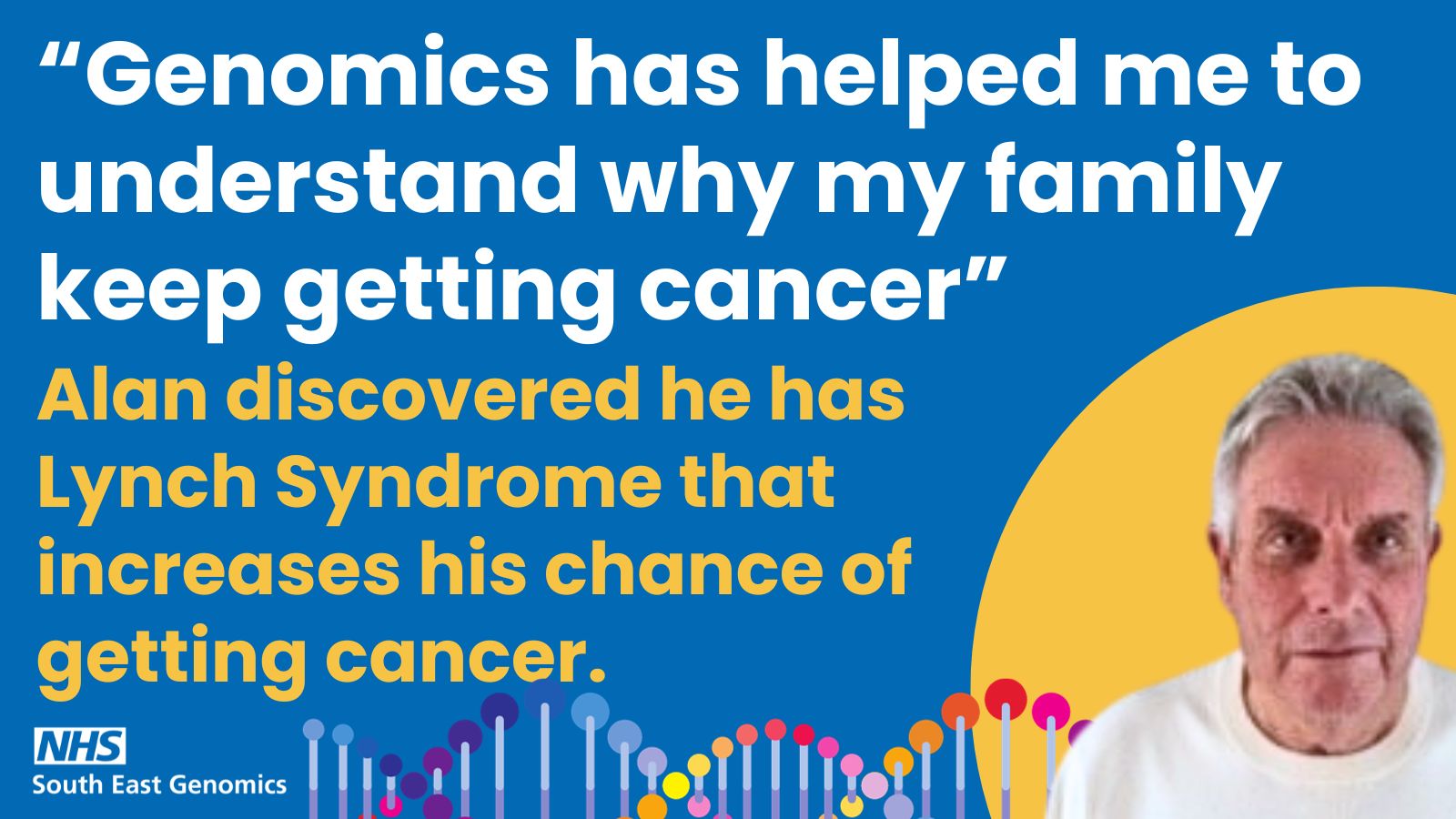
Alan’s Mum had bowel cancer when she was 40 years old. Unfortunately, she then developed womb cancer when she was 60 and died. When his brother also died from bowel cancer at just 45, Alan started to look for answers.
“I read that bowel cancer could be genetic. I never knew that before, so I went to my GP and thankfully he listened to me. They told me that I couldn’t get genetic testing because both my Mum and brother were no longer with us, but I could get regular colonoscopies which would pick up any changes in my bowel. I felt like I had done something positive.”
When Alan’s younger brother was diagnosed with bowel cancer, things started to change. Alan and his siblings were offered genetic testing for a condition called Lynch Syndrome, a genetic variation which can increase your chances of developing cancer, particularly bowel cancer and endometrial cancer.
Alan, plus his two siblings and all of their children tested positive for Lynch Syndrome.
“We finally got some answers. It wasn’t the news we wanted, but it did give us power.”
All of Alan’s family now knew that their chances of developing bowel cancer could be increased to 60% over their lifetime. It also meant that they were more at risk of developing other cancers too. They started to talk to each other about possible symptoms and didn’t hesitate to flag any changes to their GPs.
“My Mum and my brother hid their symptoms and didn’t go to a Doctor until it was too late. Now we have a chance to do it differently. My sister had a preventative hysterectomy and when my niece had symptoms she went straight to the GP. Initially the Doc told her she was too young to have cancer, but the Lynch diagnosis changed that and doctors took her more seriously. She had womb cancer but luckily they caught it in time.”
Getting a diagnosis of Lynch Syndrome doesn’t mean you have cancer. It does however offer people access to regular bowel cancer screening which Alan and his sister took part in.
Unfortunately Alan has gone on to develop kidney cancer, pancreatic cancer, bladder cancer, and cancer of his small bowel. Most recently his cancer has spread to his lung. He remains remarkably positive.
“If I hadn’t known about Lynch, then I would no longer be here. The knowledge that Lynch has given me means that I listen to my body, but also that doctors listen to me. It’s also meant that I can get regular screening to spot any changes as early as possible.”
Alan’s Lynch diagnosis means that doctors are now better informed about how best to treat his cancer. He was offered immunotherapy which successfully treated his cancer.
Lynch has opened up new doors for me.
Alan now volunteers at Guy’s Hospital, travelling from his home in Bromley to help people when they arrive at the Cancer Village.
“I absolutely love it. I’ve been in their position, so I know how daunting it can be to arrive at the Cancer Village. I chat to people and help them work out where to go. I would do it every day if I could.”
Alan is determined to ensure more people know about Lynch Syndrome. Here is his advice to fellow patients.
“Tell everyone about Lynch Syndrome. Talk to your GP and make sure they know about it and understand that they need to listen to you and your symptoms. Also talk to your family. Help them to understand that they too can get tested for Lynch.”
Up to 300,000 people are thought to have Lynch Syndrome in the UK right now, but only 95% of them know they have it.
Everyone who is diagnosed with bowel or endometrial cancer are now offered genetic testing for Lynch Syndrome as part of a national NHS programme.
Lynch Syndrome is caused by a fault in a gene that helps to protect you from cancer. The fault means that abnormal cells are more likely to develop and then turn into a cancer which means you are six times more likely to develop cancer compared to someone who doesn’t have Lynch Syndrome. Unfortunately, these cancers often occur in people at a younger age, and they can get cancer several times.
A genetic diagnosis of Lynch means that doctors can treat your cancer more effectively, but it also means your family are entitled to genetic testing for Lynch and so may help prevent cancer in them.
